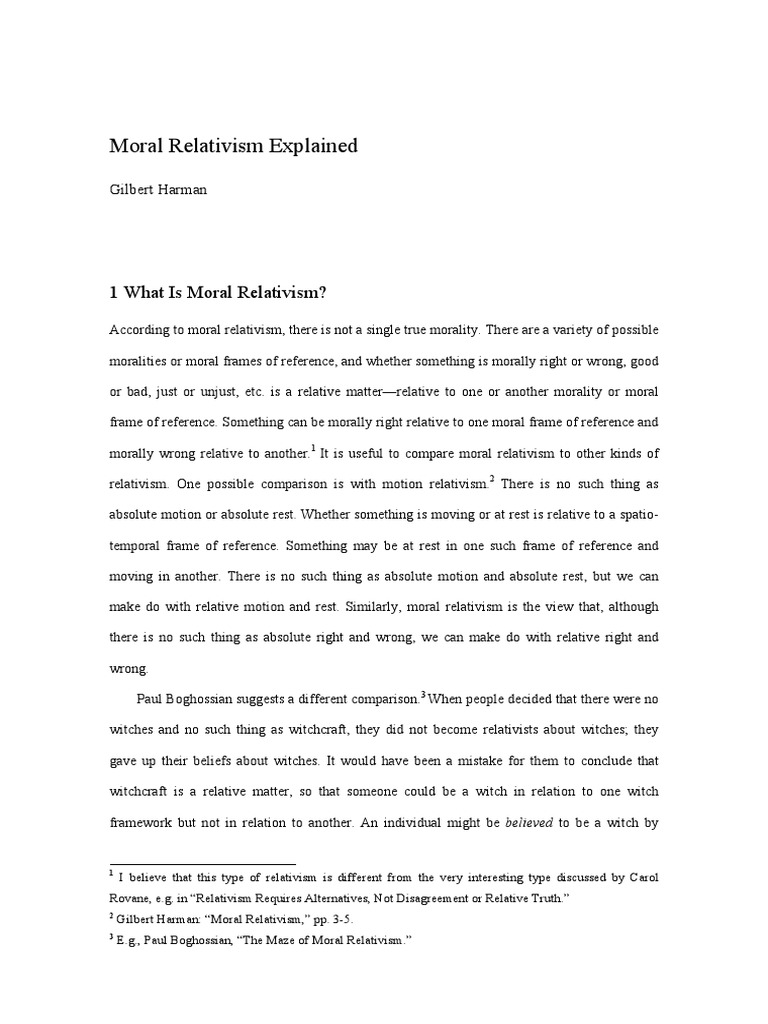Moral relativism is akin to a prism refracting light into a spectrum of colors, illustrating how the perceptions of morality can vary dramatically from one context to another. It challenges the notion of absolute truths in ethics, suggesting instead that morality is not a universal constant but rather a construct that evolves with cultural, societal, and individual perspectives. This approach to ethics captivates scholars and philosophers, igniting debates that span across disciplines, from psychology to anthropology and beyond.
At its core, moral relativism posits that what one culture or society deems “right” may be considered “wrong” in another. This can be exemplified by the age-old debate surrounding practices such as honor killings, which are sanctioned in certain cultures but condemned in others. Such intricate ethical quandaries unveil the complexity of human values and the rich tapestry of cultural narratives that shape them. Just as the same water can freeze into ice or evaporate into steam, moral principles can shift and transform based on the myriad influences of history, geography, and social dynamics.
One compelling aspect of moral relativism is its emphasis on empathy and understanding. By recognizing that our moral frameworks are not inherently superior to those of others, we cultivate a certain humility. This paradigm encourages dialogue across cultural divides, promoting an understanding of differing ethical stances rather than immediate judgment. It is like navigating a labyrinth: every path taken reveals alternate routes and perspectives, fostering a deeper insight into the human experience.
However, the doctrine is not without its critiques. Detractors argue that moral relativism can lead to ethical disarray, permitting harmful acts under the guise of cultural acceptance. For instance, when discussing issues such as human rights or environmental protections, the relativistic lens may inadvertently justify abuses or neglect. Herein lies a delicate paradox: while moral relativism champions tolerance and pluralism, it can also obscure the urgency to confront injustices that demand universal acknowledgment and action.
In this nuanced debate, we must also consider the concept of universalism, which asserts that certain moral principles transcend cultural boundaries. Proponents argue that some values—such as the intrinsic worth of human life or the imperative to protect our planet—should be upheld universally. The discussion between relativism and universalism is like a grand chess match, where each move must consider the potential repercussions, and where the stakes of morality are both high and transformative.
Consider further the implications of moral relativism in the context of environmental ethics. The climate crisis exemplifies the ethical dilemmas that arise when multiple cultural perspectives intersect. Wealthy nations might advocate for stringent carbon emissions regulations, while developing countries prioritize immediate economic growth, sometimes at the expense of environmental sustainability. In this arena, moral relativism elucidates the challenges of achieving global consensus, revealing how diverse historical trajectories, economic frameworks, and societal values govern responses to climate change.
Moreover, as the planet grapples with the existential threat of climate change, moral relativism poses a critical question: how do we balance the legitimate concerns of different cultural contexts while striving for a common goal? Effective environmental activism requires not only the imposition of one overarching ethic but the weaving together of various moral narratives. Just as a quilt emerges from the intricate stitching of different fabric pieces, a holistic approach to climate action must incorporate the perspectives of diverse communities, each bringing their unique wisdom and urgency to the table.
The intersection of moral relativism with environmental responsibility forms a compelling narrative. As the planet’s resources dwindle and its ecosystems collapse, the call for a global ethical framework becomes increasingly pressing. The scars of climate change are visible, yet the perceptions of these scars vary dramatically across different cultures. Some view them through a scientific lens, others through spiritual or economic ones. Each viewpoint holds validity, yet the without a collaborative effort toward a unified response, the solution may remain just out of reach.
In conclusion, moral relativism encompasses multifaceted dimensions that reveal the intricate nature of human morality. It promotes empathy and cultural understanding while simultaneously posing significant challenges in addressing global ethical dilemmas, particularly in the face of climate change. The engagement with moral relativism calls for an exploration of values that transcend borders. Effective leadership must emerge from this exploration, weaving together the insights of varied cultures to forge a path forward in an increasingly interconnected world. The dialogue on morality—and its ramifications for our global society—remains open, vibrant, and ever-evolving, much like the myriad responses to the call for environmental stewardship.
